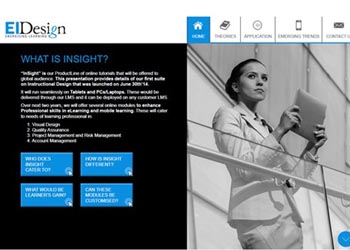
With the changed workplace dynamics and need to offer more short, focused remote learning, Microlearning is a must have learning strategy today. In this article, I show you the benefits and best ways to use Microlearning in corporate training.
Microlearning – An Overview
Our world is filled with distractions and dwindling attention spans. This raises questions on how your learning strategy should be improved to offset these challenges. Let’s take a closer look at this to conclude what approach would offset them.
Challenge 1: Limited Attention Spans
The advocates of the 90/20/8 rule have made noteworthy observations about human attention spans. According to them:
- Individuals are completely attentive and alert in the first 8 minutes.
- Once 20 minutes are up, the attention level begins to dip.
- Once it reaches the 60–120-minute range, the alertness level entirely drops.
Challenge 2: Dwindling Attention Spans
According to the findings of a study by Microsoft, the human attention span (which is about 8 seconds) is lesser than that of a goldfish (which is about 9 seconds).
Challenge 3: The Forgetting Curve
Then there’s the “Forgetting curve” too that hypothesizes that we fail to recall nearly 80% of what we learned in the last 30 days if there is no reinforcement offered.
These three challenges should be tackled for learning to be sticky, easy to apply on the job, and reflect in a demonstrable gain for businesses.
Let us look at how Microlearning can come to your rescue:
- To begin, you can utilize Microlearning to support your Formal Trainings. The reinforcement offered in the form of Microlearning helps learners retain the learning you provided them in the Formal Training.
- An important aspect of Microlearning is that it is short, concise, and learners tend to finish going through a Microlearning nugget under a 3-to-5-minute window. This helps nullify the “Forgetting Curve” and offset the attention span challenge.
- Such short trainings then covert to faster completions, thereby gaining you higher completion rates.
How Does Microlearning Benefit Corporate Training Programs?
More Freedom and Flexibility for Learners:
The flexibility Microlearning offers with regard to short duration courses and the ability that it creates for learners to learn on demand helps meet their expectations of having an engaging experience.
Engaging for Learners:
Microlearning based trainings fit in as a highly effective approach, with its ease of consumption, to engage learners and enable organizations to enhance employee performance.
Improves Knowledge Retention:
The design formats of Microlearning include rich media formats that lead to better retention of knowledge.
Faster Course Delivery:
Microlearning helps deliver short, focused training content to your learners that can produce specific outcomes in a shorter timeframe.
Affordable:
Due to its short training duration, Microlearning costs are much lower than traditional eLearning costs. They can be built and implemented much faster than traditional eLearning.
What Are the Shortcomings of Microlearning?
Not a great match for complex concepts:
Microlearning may not work in situations where the training program is long and complex (that is, trainings that have complex concepts and nested learning pieces). In these situations, it makes more sense to organize the training as a single, larger learning unit.
May not be ideal for in-depth training:
Breaking down such content into multiple nuggets can be counterproductive. It can initiate a rather disruptive learning experience and impact the learning takeaways adversely. In this case, a Macrolearning approach would be the right fit, instead of Microlearning.
What Are the Best Ways to Implement Microlearning in Your Corporate Training Environment?
Get buy-in from leaders:
For the training to be successful, it must have the buy-in of the senior executives in the organization. To get this, the training should have a clear definition (overall objectives and how they align them to business needs and organizational goals). It needs to be reinforced by the approach plan and communicated to the senior executive’s team to obtain their feedback.
Make sure the technology environment is suitable for Microlearning implementation:
Microlearning nuggets are designed for and delivered in rich media formats. Their succinctness and accessibility across multiple devices make them a great fit for just-in-time training.
Identify objectives:
Microlearning is not just breaking down a 10-hour training into small pieces. It’s an action-oriented method of providing bite-sized learning so learners can learn, act, and practice. The standard way to go about offering Microlearning nuggets is to recognize the larger learning objective and then drill it down to micro levels.
Learn at your own pace:
Learners love Microlearning based training as it gives the control to the learners and they can decide when they want to consume the content.
To supplement Formal Training:
You can use different types of Microlearning to support your Formal Training. You can use nuggets to offer reinforcement to the primary, Formal Training. Alternately, you can also provide a series of nuggets to test the learners (for example, micro quizzes).
Boost engagement by integrating hands-on activities and simulations:
An interesting Microlearning format is to use a parallax approach that is commonly used in websites. It applies the same technique to simulate a learning path that learners can “scroll through.” In conjunction with the learning path, you can aslo add interactions and quizzes.
How to Get Started with Microlearning?
Make it easy for learners to get started and stay the course:
Macrolearning looks at the bigger picture and is typically associated with longer seat times that cover complex concepts. It provides a wide range of related concepts in the same course. Contrary to Macrolearning, Microlearning focuses on accomplishing specific outcomes over a short seat time. Its technique of connecting multiple nuggets over a learning pathway aids learners to learn, apply, practice, and whet their skills. This leads to the keeping learners hooked to the course.
Make Microlearning Mobile-friendly:
Microlearning can leverage Mobile Learning further—particularly, Apps for Learning: Building on the wider adoption of Mobile Learning in organizations, it will be the mode L&D teams would prefer for varied corporate trainings.
It will leverage specific formats like Mobile Apps for Learning where a personalized learning path with Microlearning nuggets can be provided to learners. This approach can be applied to both Formal Training and as just-in-time learning aids within the learners’ workflow.
Keep it relevant and concise:
Unlike formal learning content, learning in the flow of work requires targeted, concise, and focused content. Long-form macro content won’t apply in these environments and Microlearning content is ideal to craft effective learning in the flow of work environments.
Incorporate videos:
You can create effective Microlearning based training with Interactive Videos. This solution can be targeted at learners who are always on the move and depend on their mobile devices for their digital learning needs, specifically when it comes to engaging and interactive content. The capability of videos as a medium is well established. They are a highly engaging and high-impact media format.
Use a conversational tone for better engagement:
A great Microlearning strategy to engage the learner is to use a conversational tone. A conversational tone comprises simplicity of expression, concise information sharing, a friendly approach, and encourages reflection. It is not forceful, preachy, or condescending.
Use ‘spaced repetition’ more frequently:
Spaced learning is an effective method of overcoming the Forgetting Curve. At regular intervals, offer additional Microlearning with practice opportunities for learners. This helps reinforce what they learned, solidifying their faculty to recall information when they need it.
Use innovative ways to encourage ‘binge-learning’:
To accomplish this, organizations need to create learning and performance ecosystems. These ecosystems help promote employee learning habits and drive continuous learning in the workplace. The concept of Microlearning can function as a catalyst.
Parting Thoughts
I hope the benefits and ways to implement Microlearning in your corporate training environment mentioned in this article provided you with insights to offer more short, focused remote learning through Microlearning.
Meanwhile, if you have any specific queries, do contact me or leave a comment below.



